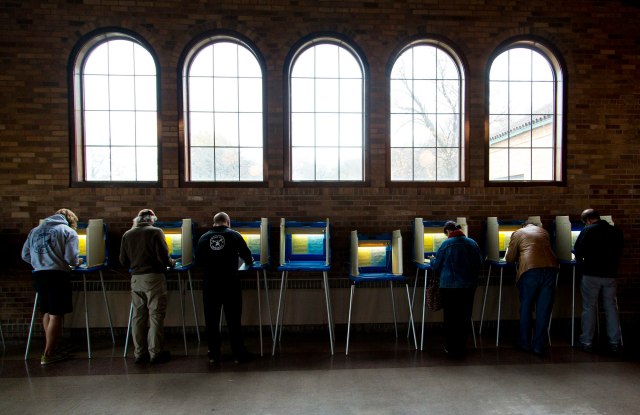Credit: Darren Hauck / Getty

America goes to the polls tomorrow in the country’s midterm elections.
Or does it? It would be more accurate to say that America stays at home – because turn-out for midterms is typically below 50% (though maybe not this time).
Non-voters can be seen as the deserters of democracy; or, from another point of view, the conscientious objectors. Alternatively, their absence could be diagnosed as a form of exclusion – a deliberate attempt to keep the ‘wrong people’ out of the political process.
This latter view is especially prevalent on the Left – not least because non-voters are disproportionately young, low-paid and non-white (and thus, supposedly, a threat to the rich and powerful). Writing the New York Times, Emily Badger asks “what would happen if everyone voted?”
“It’s impossible to know what would have happened had the people sitting out elections voted. But Bernard Fraga, an Indiana University political scientist, has tried to gauge that alternative reality using data from the Cooperative Congressional Election Study, which annually surveys thousands of Americans.
“The survey asks which candidates people preferred even if they did not vote. And if we add their preferences to the voting population in the last several elections, we get different election results.”
Re-running the 2016 presidential election along these hypothetical lines produces a Clinton victory – though not quite in the way one might expect:
“Many white voters who preferred Mr. Trump sat out 2016 as well. So in this full-turnout counterfactual, Mrs. Clinton doesn’t overcome Mr. Trump’s narrow victories in Wisconsin, Michigan or Pennsylvania. Rather, she flips Florida, North Carolina and Texas.”
But would a substantially higher voter turnout really shift politics to the Left? Would majorities for economically redistributive and socially liberal policies suddenly materialise?
I wonder. For a start, no party should presume to ‘own’ certain segments of the population. Surely, the lesson of Hillary Clinton’s campaign is never to take any part of your voter base (or potential voter base) for granted.
Attracting new voters might also change the voting preferences of existing voters. For instance, a radically redistributive tax-and-spend agenda would require not just a mandate, but also the money to pay for it. Scandinavian levels of redistribution depend on many more people (i.e. not just the wealthy) paying higher taxes, which would, most likely, expand the voter base for fiscal restraint.
Then there’s the American Left’s social and cultural agenda. Would more of that get through if more young people and non-white people voted? Well, I’d refer those who might assume so to findings showing widespread hostility to political correctness across all age groups and ethnicities. There’s also research showing that the most unrepresented voters in America are those who combine support for state intervention in economic policy with culturally conservative viewpoints on various non-economic issues.
Rather than face up to these awkward realities, it’s easier for progressives to focus (not entirely without reason) on bureaucratic obstacles to voting:
“Hourly workers, who vote at lower rates than professionals, may not have paid time off to vote. Minorities, who vote at lower rates than whites, have historically been the target of voter suppression laws. Structural barriers to voting and attitudes toward it are closely related.
“In trying to separate them, we talk about voting in ways that seldom apply to other rights.
“‘We don’t say you have to prove that you have the right to religion,’ said Carol Anderson, a professor at Emory and the author of a recent book on policies curtailing African-American participation. ‘We don’t say you have the right to free speech, but you have to prove that you’ve earned it.’”
America certainly has a history of voter suppression, especially in the South. Present-day voting arrangements should also be streamlined and regularised across the states. However, the analogy drawn between the right to vote and the rights to free speech and religious liberty is deeply flawed. Free speech is not rationed. It confers the right to say as much or as little as you like – it does not depend on everyone using it to the same extent. Similarly religious liberty does not require everyone to be equally religious. The democratic ideal, however, is that everyone has an equal say at the ballot box.
One person, one vote is as close as human societies have ever got to perfect equality. As such it does require some policing to ensure that no takes more than what they’re entitled to. If the bureaucratic hurdles are no higher than they need to be, it’s not unreasonable to ask would-be voters to jump over them.
In any case, it’s wrong to see non-voters as non-participants. Not voting still sends a message – a quantifiable signal that politics as usual is insufficiently inspiring and the electoral choices on offer insufficiently meaningful.
Non-voting is also pregnant with possibility. If they feel they can make a difference, non-voters can become voters where and when they’re least expected. No habit of voting means no habit of voting for a particular party. Non-voters are therefore the wildcards in every election. And given how many of them there are, they can, if they feel so inspired, make a big difference. In the UK, habitual non-voters had a key role in the shock results of the Brexit referendum and the 2017 general election.
Far from being non-participants in our democracy, non-voters are a crucial component – a psephological Sword of Damocles, hanging over the political establishment.










Join the discussion
Join like minded readers that support our journalism by becoming a paid subscriber
To join the discussion in the comments, become a paid subscriber.
Join like minded readers that support our journalism, read unlimited articles and enjoy other subscriber-only benefits.
Subscribe